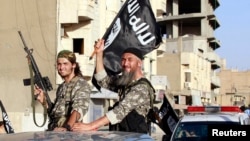With the Sunni jihadist group ISIL stepping up attacks in Syria along the border with Turkey, concern is growing in Turkey that the violence could spill over.
Earlier this month, Istanbul’s Jafari Muhamadiye Mosque a mosque belonging to Turkey's Shi'ite Muslim minority was burned down. The attack was blamed on ISIL and is seen as a possible harbinger of future ISIL attacks, which could threaten Turkey's complex social fabric.
Istanbul is home to large numbers of adherents of both Sunni Islam and Shi'ite Islam -- or Jafari Islam, as the latter is known in Turkey. But tensions between the two groups have been rising following the arson attack.
Speaking in the burned out ruins of his mosque, Imam Hamza Aydin said he has no doubt sectarianism was the motive for the attack.
Aydin said that just before the attack, a group of men came to the mosque, and said that Jafaris “worship stones” and threatened to set fire to the mosque.
He said mosque authorities went to the police, but they did nothing.
Turkey’s neighbors Iraq and Syria have seen growing sectarian strife between Sunnis and Shi'ites, blamed mainly on the emergence of ISIL, which now calls itself simply the Islamic State. The group regards Shi'ites as heretics.
Analyst Sinan Ülgen of the Carnegie Europe Institute in Brussels said fears are growing that ISIL's sectarian war is coming to Turkey,
"There are allegations that some members of a network that claim to be close to ISIL have engineered this,” Ülgen said. “Some of these militants groups have been able to establish their networks over the years, at the time the Turkish government turned (a) blind eye to many of these opposition groups. It just shows you Turkey is not going to be safe from all the instability from Syria."
Turkey's ruling Islamist-rooted AK Party is one of the main supporters of the rebel groups fighting the Syrian regime. The arson attack on the Istanbul mosque has not been the only such incident. Shi'ites in Istanbul claim they have been the target of increasing sectarian violence.
A shopkeeper in one of Istanbul’s Shi'ite neighborhoods said that recently, a man shouting he was from ISIL starting attacking Shi'ites outside another mosque in Istanbul.
Electoral politics could be also be a factor behind the rising tensions. Prime Minister Recep Tayyip Erdogan is running for president in next month’s elections, and he is rallying his largely conservative Sunni religious base. Critics accuse him of increasingly using sectarian language aimed at Shi'ites. He also resisted calls in the media and from Shiite groups to condemn the Istanbul mosque attack.
But Mehmet Gomez, head of the Diyanet, the state body that administers the Islamic faith in Turkey, did visit the burned out mosque
“We will rebuild the mosque together,” he said at the site of the mosque. “We are all Muslims, we use Korans and mosques. We will replace the burned books in the best possible way together, he said, and then we will gather here again and pray together.”
Observers say such gestures could prove crucial amid rising tensions and concerns over the growing danger of radical groups like ISIL.
Still, ISIL flags and bandanas are increasingly visible at protests organized by Islamic groups, indicating that at least some Sunnis in Turkey have sympathy for the group. Analysts warn that ISIL's increasing presence is likely to test the cohesiveness of Turkish society.




